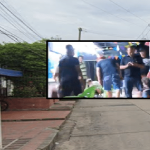The director of the National Road Safety Agency (ANSV), Pablo Martínez Carignano, maintained that the “overwhelming approval” that the Zero Alcohol bill At the national level, it will allow “lowering hospitalizations” without affecting the consumption of beverages, and warned that “we must not naturalize deaths and talk about driver’s education”, especially among the youngest, whom he characterized as the most “permeable” to healthy habits.
The official spoke with Télam about the importance of education and the role of young people in building road awareness, the treatment of the Zero Alcohol Law in the Upper House which, if sanctioned in extraordinary sessions, will be established at the national level. that the blood alcohol tolerance for driving motor vehicles will be zero.
-Martínez Carignano, how do you foresee the treatment in the Senate for the national approval of this project that has already been implemented in some provinces?
-I think that the overwhelming majority that it had in the Chamber of Deputies will be repeated in the Senate, where the result of the vote went from 195 (positive votes) to 19 (negative votes). This Zero Alcohol project does not recognize certain cracks or political parties, there is a broad consensus that it must be accompanied. Of course, with the exception of some representatives of the wine-producing provinces who echo the complaint of winemakers who make claims that are not supported by evidence.
-What do they point out with these statements?
-They (for the winemakers) maintain that Argentina is a wine-producing country and that this law would affect the consumption of that drink, when not only in the provinces that have had a Zero Alcohol law for a long time, but also in the countries of the region As is the case in Uruguay -which have similar consumption patterns- accidents due to alcohol consumption decreased a lot and the consumption of the drink did not decrease.

-An argument against that is usually used is that this law would affect the alcoholic beverages industry.
-The evidence indicates that it is not. In fact, in Brazil there is a study published in the journal Nature, with rigorous filters, in which a projection was made of all the hospitalizations that were avoided in that country due to the Zero Alcohol law, and at the same time the rates of consumption. Hospitalizations dropped but consumption did not drop, here -in Argentina- the same thing will happen.
-In this sense, do you consider that, in addition, there is great acceptance by the people?
-People understand that a glass of wine at the table, with friends or at a party, brings pleasure. But that, taken to drive, what it brings is pain. That is why alcohol must be totally dissociated from driving. This means that nowadays you are in a bar and you are not going to see anyone lighting a cigarette, even if they feel like it, because it is already socially accepted that it is not done in a bar. 10 years ago, when smoking was prohibited in bars, there were also reactions from gastronomy professionals saying that the world would collapse with that.
-How do you explain to a person who considers that a glass of wine does not alter reflexes that it is necessary to lower the consumption tolerance to zero if they have to drive?
Also with evidence. From the World Health Organization (WHO) to local toxicologists, countless studies have been carried out in which all people admitted to hospitals with injuries caused by traffic accidents are tested and their blood alcohol level is measured. . In most cases they are graduations of 0.3 or 0.2 (grams per liter of blood). Alcohol begins to affect from the initial intake, 0.5 is a measure of convention and never affects two different people in the same way. And statistics show that alcohol is present in one in four fatal traffic accidents.
-What repercussion does the law have among your provincial peers?
– Only the representative of Santa Fe has expressed himself publicly against this. As for the other representatives, not even Mendoza or San Juan have spoken out against it.
-What role do young people play in this initiative?
-Young people are much more permeable for everything that is road safety, adoption of new habits, more responsible coexistence on public roads and others. I believe that the most conservative group is from 30 to 60, of the younger ones I am hopeful that they will quickly say: no, I don’t drink.
-How is the issue of driver’s education approached, taking into account that boys and young people are more permeable to changing habits?
-All the provinces, and there are already 21, except Mendoza and CABA, have all subscribed to the Federal Education Plan for which a web platform is being planned where there will be practical content so that teachers can impart driver education in a transversal way in subjects such as physics, mathematics and music.
-What other aspects contribute to building awareness about road safety?
-Education is very important along with non-formal education. The campaign, the messages, we want people to talk about it. Road safety in Argentina is a case of public health, and yet it goes unnoticed or naturalized.
– What is the current situation of road accidents in Argentina?
-Today, 60% of the deaths are motorcyclists, the vast majority are concentrated in urban areas, in cities and towns. That is already giving you a guideline that it is a matter of mayors. For this reason, one of the great debts that we have is that, at the local level, the mayors get involved.
-Why do you emphasize this responsibility in certain municipalities?
-You go to cities like Posadas (Misiones) or capital Formosa and you will find yourself wearing a helmet almost like the City of Buenos Aires. But you go to San Miguel de Tucumán and no one uses it, to give three nearby examples. It is a matter of making the decision, of course not going hunting, but recognizing that there is a cultural issue, that the motorcycle is the family vehicle and the work tool. Why do they wear a helmet in Formosa, if they are the same citizens? It is a matter of taking care of life and also taking care of the finances of the municipal state.


















